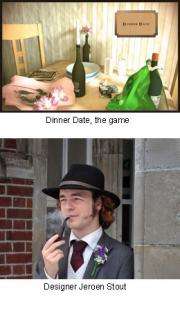Game-on for a new way of playing

A University of Portsmouth graduate has designed the first video game of its kind, where the player enters the sub-consciousness of the main character.
Dinner Date features one man sitting at a dinner table waiting for his date to show up. Players listen in to the character’s doubts and fears and watch his true character unfold over the course of the game.
The 25-minute game went on sale in mid-November and has since won a lot of attention from the games industry. Reviewers have described it as refreshing, truly innovative, intriguing, intimately and startlingly personal, not so much a game, as an experience, and cerebral. One reviewer said: “It's great to see people trying to address a massive problem in the games industry -- that of a huge lack of depth in the narrative of most titles.”
Dinner Date was designed by Jeroen Stout, who designed the prototype of the game for his Master’s course, supervised by award winning game designer Dan Pinchbeck. Jeroen graduated in the summer and has now started his own game design company, Stout Games.
Jeroen said: My aim is to create games which are quite different and are not about action or major consequences, but are instead about creating something that is intellectually fulfilling. Dinner Date is the first work created with this in mind; it is a character portrait in the form of a game. You get to know the main character, Julian, and his internal struggle while waiting for his date. You do this in a wonderfully mimetic way by being his sub-consciousness for a while.
“Letting go of goal-driven games allows you to make things which are far more interesting.”
Jeroen said: “The choice of not making the game have any goals or challenges is quite unusual, though I did get more comfortable with that by looking at previous cases of this, such as in the games of Tale of Tales and those of Dan Pinchbeck himself.
“When you give the player challenges he immediately starts thinking strategically – but you can reach a wide range of people once you stop expecting the player to solve the puzzle or kill a group of people but instead engage him with a man sitting at his table waiting for his date to show up.”
Dr Pinchbeck, from the School of Creative Technologies, said: “What Jeroen has done is looked at a totally different kind of content, a totally different relationship between the player and the character they control in the game, and he's actually made a game to prove it can be different and it does work.
“Jeroen is at the leading edge of a new generation of game developers and students. They are challenging the old guard by being as good at building games as they are studying games, and they are looking for ways to practically show how their research can work in practice. That's massively important for gaming.
“What's brilliant about the whole art or experimental game scene is that it's questioning what can work as a game, it's cutting new ground, and that's really important for us as a university to be supporting. It's fantastic that here at Portsmouth we're really at the centre of that movement.”
Provided by University of Portsmouth




















